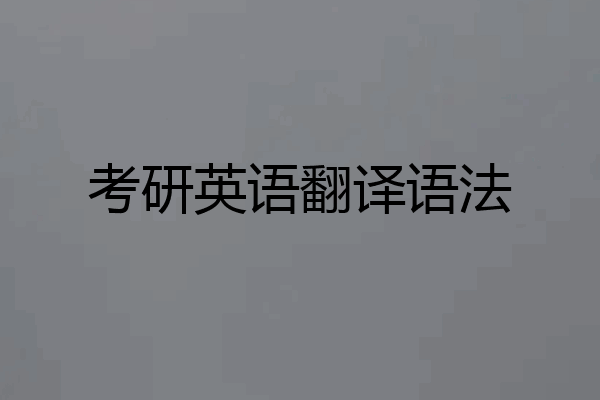 我不是小痴
我不是小痴
共2条回答120浏览
-
 最爱串串香2小时前发布
最爱串串香2小时前发布-

译成“被”字句
Not long ago,with the country entering a recession and Japan at its pre-bubble peak , the U.S. workforce was derided as poorly educated and one of primary causes of the poor U.S. economic performance.
【不久前,美国经济衰退,日本处在泡沫前的顶峰。美国劳动力被嘲笑受教育程度低,被揶揄是美国经济表现不佳的主要原因之一。】
原句是由“with复合结构+主句”构成,原句中的被动句是“the U.S. workforce was derided”即“美国劳动力被嘲笑”,这样的表达方式符合汉语的习惯,因此可以直接保留被动的语态。
加上泛称
Attempts have been made to curb this tendency,for example,by trying to incorporate some measure of quality as well as quantity into the assessment of an applicant's papers.
【为了控制这一趋势,人们做了许多努力,比方说,将质量和数量等标准纳入申请论文的考核中。】
本句中的被动语态构成是“Attempts have been made”即“努力被做”,但显然这样的翻译表达是不符合汉语的习惯的,而“努力”的施事者显而易见是“人们”,所以此处翻译时需加上泛称,给动作以主体,即“人们做了很多努力”。
译成动宾结构
All that I ask is that alternatives be offered instead of putting all of us on the road to calculus.
【我所要求的是提供替代方案,而不是让我们所有人都走向通往微积分的道路。】
本句的被动语态是“alternatives be offered”即“替代品被提供”,但在汉语表达中,“替代品被提供”的说法是生硬不通顺的,且“提供”这个动作的实行者也尚不清楚,因此考虑翻译成“提供替代品”这种动宾结构更符合汉语无主句的表达习惯。
通过以上例子可以发现,在处理被动语态的时候:
可以先考虑将其意为“被动句”,若被动句符合汉语表达习惯,则保留被动的用法;
若被动句不符合汉语的表达习惯,则考虑是否可以增加泛称,给谓语动词施以主体,这种情况常见于it形式主语开头的被动语态;
若前两种情况翻译的译文 都不符合汉语的表达习惯,则可以考虑译成动宾结构,将被动语态的谓语动词前置到主语前翻译。
-
-
-
考研英语翻译技巧:
1.翻译能力的提高,并不在于一时勇悍的战斗几个小时,而是平时对于句子的点滴积累。阅读理解中所遇到的长难句应做特殊标记,并摘抄或裁剪粘贴到笔记本上,应单独拿出20分钟分析句子结构画出结构图并笔译到笔记本,每次两三个句子最佳,如此将分析句子、研究句子渗透到每日的复习中,日积月累方可牛逼。
2.翻译并不推荐单独练习,在日常复习长难句的过程中将其落实到纸面上即可。总而言之,在正确的战术以及战略面前,像翻译、新题型以及完形填空都是‘paper tiger’。
3.be designed to应翻译为‘旨在’,而不能翻译为被用来、被设计用来;seek to do应翻译为‘力图’;nothing more than应翻译为‘不过是’;more than anything应翻译为‘更重要的是’
诸如此类短语翻译应力求简洁,切忌拖泥带水学弟学妹们应参照答案多做总结。
4.by all accounts应翻译为‘人们普遍认为’;be oblinged tosb应翻译为‘感谢谁谁谁’;it strikes one that应翻译为‘人们会突然想到’
5.若文章中出现‘a、an、the’等冠词,切忌翻译为‘一个、这个’,此时冠词应不做翻译;‘one做主语并不应该翻译为一个人,可翻译为‘我们、人们’,并且不要重复翻译某一个名词。
6.翻译、新题型、完型正是考研英语试题中的鸡肋,并不需要专门练习,但这正是拉开差距的关键。当战术正确,甩掉畏难情绪,树立信心的时候,这些都是纸老虎。
扩展资料:
考研英语如何准备考研翻译题?
第一步:找中心句,数句子数量。在这一步中,我们得通读全文找到中心句,掌握了文章的主旨大意后,同学们在翻译后文时译文往中心靠就行了。而文章的中心句通常在文章前部,例如首段首句、首段转折后(即but, however等表示转折的词后)或者是第二段的首句。而数句子数量看起来似乎没必要,但是我们能通过数句子数量对文章的难度有一个把握。因为英语二的篇章翻译词数在150词左右,句子越多,短句越多,句子越少,长难句则越多。
第二步:逐句翻译。在找到中心句,数完句子后我们就可以对文章进行翻译了,这里涉及到的一些语法知识我们会在翻译文章时给大家一一分析。
第三步:全文调整。在逐句翻译完后,我们一定要通读译文,看句子与句子之间有没有表达需要调整,以及段间是否需要衔接过渡,增加逻辑连接词。当然,在这个过程中,我们也要检查自己是否写了错别字。
-
